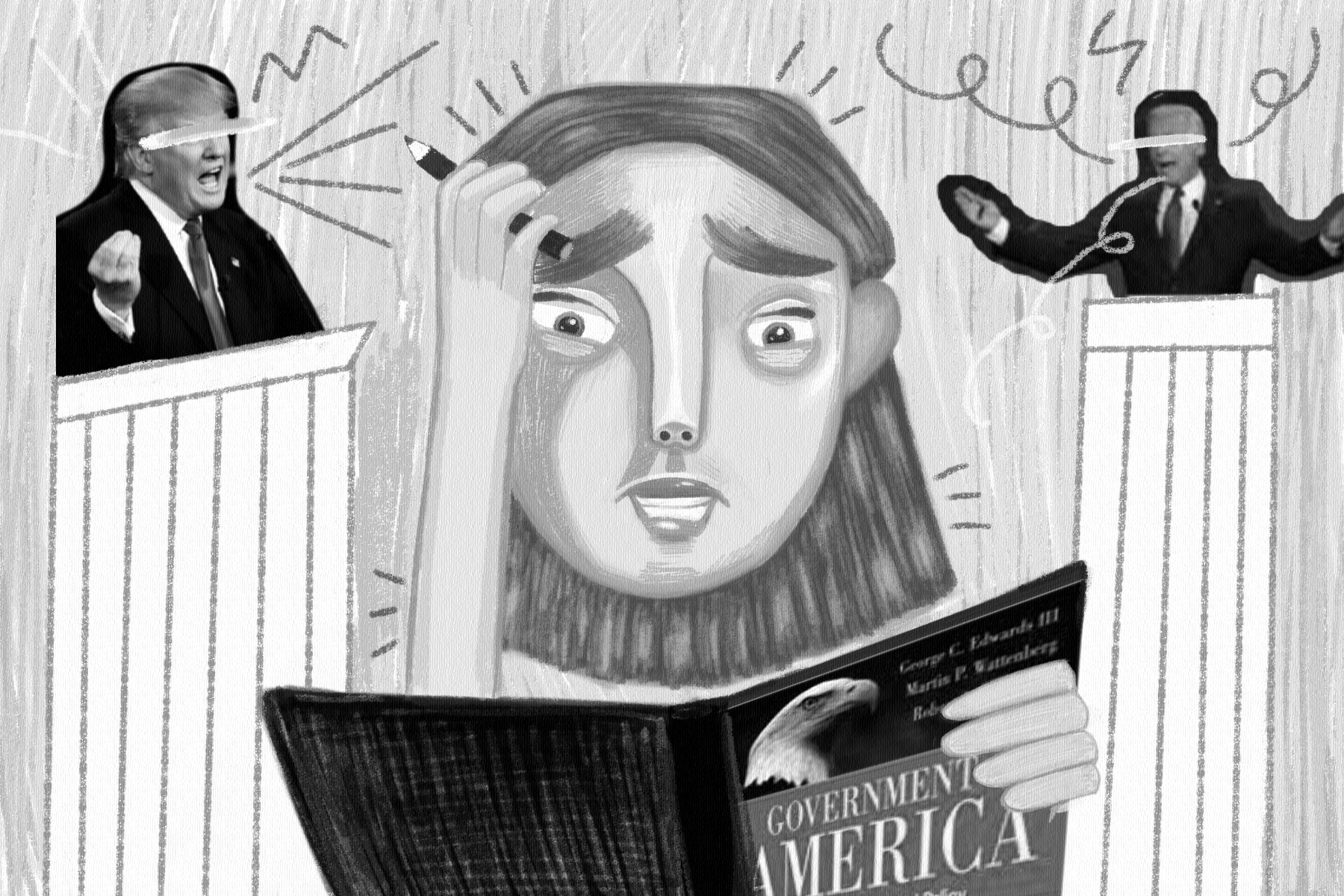In 2016, only 26% of Americans could correctly name all three branches of the American government — a number significantly lower than years before. With the 2020 presidential election nearing, I’ve been thinking about the American government, and how it was taught to me.
I think about the measly one year of A.P government I took during my senior year of high school that I remember absolutely nothing from. I think about how the other day, I spent an embarrassing amount of time trying to figure out the difference between the Senate and the House of Representatives. Then I think about how devoting just one year to understanding the system that directly dictates the well-being of so many people feels dangerous — something that causes an American detachment from political involvement, risking the lives of many through ignorance.
The concept of the American politician is amidst an agitated state of transformation, pointing to the inconsistent and contradictory ways American politics are communicated to the public. This has led to the notion that politics belong to politicians and lawyers, which sustains the idea that American politics exist beyond the reach of average citizens.
The complicated legal language, otherwise known as “legalese,” found in bills, laws and congressional reports works to gatekeep or control access to political power. Politics shouldn’t be confusing, and the average American citizen, regardless of education level, should be able to truly understand how their government works.
Congress is still overwhelmingly white — something that diminishes the representation of marginalized groups. With a political climate that has become inaccessible to the average person, the confusing nature of political language further deepens the divide between the political system and the average citizen.
A third of Americans do not know that absentee voting is an option during elections. Considering America’s disappointing history of voter suppression, this knowledge gap is indicative of how a lack of political knowledge can preclude exercising political power.
The immense verbosity found within discussions of politics makes political participation seem out of reach for some citizens. There are many issues within the American democratic process, specifically regarding other legal decisions that sustain oppressive systems. For example, a felony conviction results in disenfranchisement, otherwise known as the process of stripping someone of their right to vote. Disenfranchisement has become a reflection of systemic racism, as 38% of those who are disenfranchised are Black, despite Black people comprising just 13% of the American population.
Depending on the felony, voting rights can be restored, but the convoluted process of restoring an individual’s voting rights exemplifies the way in which “legalese” confuses people out of political power. Voter restoration is contingent on the type of felony and the state it occurred in along with a handful of other specific factors. If this is considered with the resources one would need to adequately restore their rights, this process becomes reliant on systems based in oppression.
The Very Black Project posted a video about communication and its role within legal and political systems, particularly highlighting how a “radical shift in communication” is necessary to dismantle anti-Blackness. The video states that “Most Americans are walking around with small amounts of information to make big decisions on our communities.”
https://www.instagram.com/tv/CBTWUorgA5C/?hl=en
Bills are packaged and presented to the public in a way that is weighed down by complicated political language, disguising harmful consequences by presenting seemingly positive aspects of the bill in an attainable way. This can be seen in the name of the bill, or a quick positive summary of what the bill claims to do.
The video goes on to explore ways in which the necessary shift of communication can occur, such as through media, nonprofit organizations and legislative transparency. This shift challenges the power dynamics that have been created by political language, allowing political power to extend beyond a predominately white system.
Lack of political knowledge, from state and federal levels, is rampant. With the persistent underfunding of American education, civic education remains de-prioritized, with only nine states — along with the District of Columbia —requiring one year of civic or government education. Thirty-one states only require half a year, and 10 don’t require any amount of civic education.
The Common Core centers the subject around the close-reading of three texts: the Constitution of the United States, Lincoln’s second Inaugural Address and the United States Declaration of Independence. Yet, when these texts are examined from a colonizer’s mindset — as is typically the case in history classes — the more accurate historical implications of the texts become lost in a one-sided depiction of American history.
I think about how my U.S history teacher clung to the ideology that America was the greatest country in the world. He said that, verbatim, to a room of young people. While my class may have rejected that idea, that was still the lens the class was taught through. This form of patriotism paired with the lack of political knowledge is not only dangerous, but perpetuates systemic racism.
Amendments, which are also chock full of complex political language, are another example of why this shift in communication is needed. When considering how the political language of the 13th Amendment worked to legally maintain slavery through a loophole maintained through political diction, it becomes clear that understanding the language in the government is essential — not only to hold people in power accountable, but to shift power dynamics altogether.
Reforming the ways in which politics are communicated to the public allows for political power to be redistributed into the public. The complex nature of the ways in which political language is presented to people makes the entire system feel unwelcoming and inaccessible.
With a lack of prioritization toward civic education, it makes sense that there is such a grand detachment from the American government, leaving most Americans to figure things out for themselves. My 45 minute Google escapade of the differences between the Senate and the House of Representatives morphed into a (confusing) discussion with my roommates about the electoral college, “but who decides who’s in the electoral college?”
“It says here they’re selected state by state.”
“But what does that mean?”
We decided to go to bed.
And the more I read about how government and U.S history are taught in America, it becomes impossible to separate the lack of a cohesive understanding of American politics and the political chasm that dominates Americans perception and involvement with civic engagement. Civic engagement, ranging anywhere from voicing concern toward public issues to participating in elections through voting, is another tool necessary in shifting political power, yet a third of Americans do not know about absentee voting and half didn’t know if their state allowed ballot initiatives.
Since language and communication are tactics that can be used as forms of resistance, reforming the way in which politics are conveyed to the public is necessary in making this change possible — especially now.
















